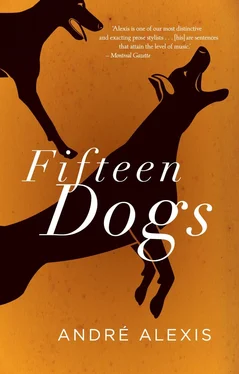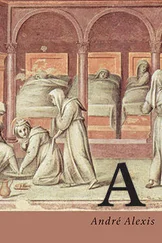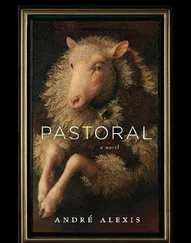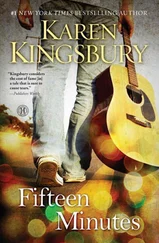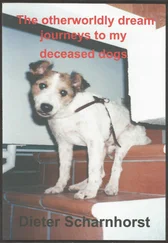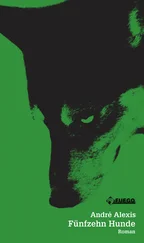— Was she displeased?
— No, said Dougie, she seemed frightened.
— Maybe she thought you might do the same thing to her.
— I felt the same, said Dougie. So, I left the creature for her.
— That was wise, said Benjy.
For a long while, the two of them sat in the living room, listening to the sounds of the woman, waiting for her to call them.
(Here, Majnoun interrupted Benjy’s account.
— That was not a good thing for the bearded dog to do, he said. Humans protect the creatures. They call them ‘cats.’
As Majnoun could not precisely pronounce the word, it came out like the ch in the Scottish word loch followed by a t . It was the sound of something caught in the throat.
— It is a good name for them, said Benjy.)
But the woman did not call them. She descended the stairs carrying the dead cat in her arms as if it were her child, holding its body to her chest.
— What have you done? she said to them. What have you done?
Despite himself, Benjy found the sight exciting. It was so oddly incongruous. And for the first time in his life, a feeling within him was so powerful it forced the low sounds of pure joy from him. In other words, he laughed. Dougie laughed as well, the two of them helplessly releasing the emotion within, as if some container inside them had broken and its contents flooded out. Benjy had released tension before but in very different circumstances and in very different ways. He had, for instance, barked happily when, as a pup, he’d rolled in the green and humid grass of his master’s front lawn. This laughter was strange, however. It was not provoked by his senses but by something almost as powerful: his intellect.
If laughter was strange for the dogs, the sight (or rather the sound) of it was clearly disturbing to the woman. She stood still at the entrance to the living room, listening to them, the dead cat in her arms. And seeing her there holding the dead cat as if it were precious, Benjy and Dougie were further amused. They could not stop laughing, their low growls like some strange fit. Clutching the dead cat to her chest, the woman got down on her knees, bowed her head, and put her hands together as if she were begging. She did not speak to them, though she was clearly speaking to someone.
After a long while, during which she fervently said whatever it was she had to say, the woman rose, opened the door to her home and moved out of the way.
If it had been up to Benjy, they would have stayed. He could feel the woman’s terror and he was certain they could exploit it. (It did trouble him that she was speaking to the unseen.) But Dougie, though he was as struck by the woman’s reactions as Benjy, wanted only to get out of the house. He bounded out the door without looking back. So, Benjy followed.
From the moment they left the woman’s house, Benjy had premonitions of disaster. They were not far from the den, and he knew the way as well as Dougie, but he followed some distance behind. Coming up to the coppice, Dougie moved even quicker, happy as he entered what had been their home. There was silence and, moments later, a burst of growls and barking as Dougie ran out again. He was pursued by Atticus and the brothers. The three sounded different — not feral, not domesticated, not like dogs. Benjy was immediately afraid and, bad luck for him, when Dougie ran from the den he ran straight at him, speaking his last words in his first tongue. That is, in his final moments, Dougie unmistakably spoke the universal language of dogs.
— I submit, he yelped. I submit! I submit!
as if he were being done by unknown dogs who, for some reason, could not understand him at all.
Recalling his friend’s death, Benjy stopped speaking. Overwhelmed by emotion, he lay down and dropped his head on a crimson patch of carpet.
He and Majnoun were quiet for a long while. Aware of the silence, Nira entered and asked Majnoun if he or his friend wanted anything to eat or drink. At Nira’s entrance, Benjy jumped up and began to walk in front of her, back and forth, looking up and barking until Majnoun told him to stop.
In answer to Nira’s question, Majnoun shook his head ‘no.’ So, after turning on the light in the room, Nira again left the dogs alone.
— I’m amazed, said Benjy, that this human treats you so well. You do nothing for it. Do you walk on your hind legs now and then? You must do something.
— I do nothing like that, answered Majnoun.
— This does not sound like the usual master, said Benjy. A master who wants nothing is not a master. And if this is not a master, it will bring you pain. You will suffer one day. It is always better to know with whom you are dealing, don’t you agree?
— I understand your thinking, said Majnoun, but this human is not a master. I do not know what Nira is, but I am not afraid.
– ‘Nira’? said Benjy. You can speak its name? That is very strange.
— Tell me what happened after the dog was killed, said Majnoun. Why would they kill him if he submitted?
— I think, said Benjy, that they could not help themselves.
+
Benjy watched as the three dogs bit at Dougie’s legs, belly and neck. Dougie struggled to the end, attempting to get away. He was outnumbered, however, by dogs who were single-minded in their attack. Dougie was as spirited and valiant as a dog could be under the circumstances, getting a few bites in himself, but his valour served no purpose, it seemed to Benjy, other than to prolong his suffering.
While Atticus, Frick and Frack were occupied with killing, Benjy backed away from the scene, his tail tucked between his legs. He would have run, but just as he turned to flee, Rosie was on him, bounding out of the den. Catching him by surprise, she had her teeth firmly in his neck before he knew what to do. He peed in submission and went as limp as a pup, but she held on and growled, forcing him to be present at Dougie’s death.
(Benjy could not express what he’d felt on watching his friend being killed. Every fibre of him had felt hatred for the three who killed Dougie. He hated them still, as he recounted Dougie’s death, but he hid his emotions from Majnoun, thinking them a sign of weakness.)
Once Dougie stopped moving, the three dogs — Atticus and the brothers — stood around his remains, as if waiting for him to get up. Atticus even nudged Dougie’s head, pushing him, as if to make certain he was dead or as if hoping he were still alive. For a moment, the killers seemed puzzled by what they’d done. You’d have said they’d come upon Dougie’s body, not that they had reduced it to what it was: an unmoving clump from which Dougie’s spirit had fled. Their bewilderment — if that is what it was — was brief. Seeing that Dougie’s body no longer moved, Atticus and the brothers turned to Benjy.
As they came at him, Benjy assumed his life was through. He made himself as small and unthreatening as he could. But, for some reason, Atticus and the brothers were no longer interested in violence. Atticus looked at Benjy, growled and returned to the coppice. The others followed, leaving Dougie’s body to rot where humans would find it.
Were it not for Rosie, Benjy would have fled as soon as the three turned away. But Rosie growled to remind him she was there and nudged him forward as if he had been one of her pups. So, against his will, Benjy returned to life with his own kind or, more accurately, with those he assumed were his own kind. As he quickly came to understand, the pack had changed. They were now almost as mysterious to Benjy as humans were. He felt the same instinctive fear for Atticus as other dogs must have felt for the twelve of them when they had first fled from their cages.
One thing for certain: he no longer belonged in the coppice.
Читать дальше
